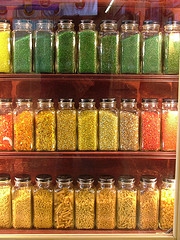
Carnival of Venice – yearly show of costumes, masks and italian jewelry
It all started as a celebration of the war victory against Ulrico, Patriarch of Aquileia in 1162. Venetians went to the streets (or better say canals) dressed in their finest costumes, dancing and singing. The magnificent party became a tradition that persisted for almost thousand years.
Every year, in February, Venice becomes one glorious party. Brocade, silks, gold and feather costumes and famous Venetian masks parade in gondolas, to the delight of tourists. Torches decorate canals at night throwing long shadows on the water, music plays long into the night. Spectacular costumes and magnificent Venetian glass jewelry decorate beautiful Venetians, and appear on pages of fashion magazines for months.
Italians really know how to party, but they also know how to dress. There is something special about Italian fashion. The colors, style, accessories, they all skillfully combine to create a rare impression of good taste and impeccable style. But, it is with jewelry that Italians really shine. Famous Venetian glass jewelry survived hundreds of years of changes in fashion and style and it is still easily recognizable as uniquely Italian jewelry. During the Carnival, one can see some magnificent antique creations of famous Murano glassmakers, and some beautiful contemporary pieces.
Carnival of Venice is a perfect time to visit this ancient, mysterious and spectacularly beautiful town. The colors of costumes, ancient palaces, magnificent churches and cathedrals, they all combine to create the impression that is uniquely Venetian. The old walls breathe history, and the songs of gondolier echo through the canals, the same way they did thousand years ago.
The beauty and charm of Venice, especially as they shine during the Carnival, make more understandable the unique beauty of the Venetian glass. Now famous all over the world, Venetian glass is the reflection of its source, product of combined history, tradition and uniquely Italian sense of style. Although many glass artists are trying to copy Venetian glass, the best they can do is be influenced by it.
Although Venetian glass makers keep and value tradition, the beauty of ancient glass-making techniques attracts many contemporary artists, in Murano and all over the world. Some of them use beads produced in Murano, others study unique Murano techniques and infuse their own imprint into the old designs. One of the most recognized names is Archimede Seguso, a son of Muranese glass artists and a partner in the Murano glass factory Barovier. He founded his own glass factory in 1946, and became its principal master and design artist. Using ancient techniques, he experimented and invented many contemporary variations, like intensely colored glass called ‘colori sovrapposte’ and a variation of filigrana technique with his collection Spinati. He lived his whole life in Murano, where he died in 1999. He influenced numerous Italian glass artists, who were inspired by Seguso’s ability to combine tradition with individual artistic vision. One of his students, Lino Tagliapietra, also Muranese, became a world-known glass artist and his work is now part of many museums all over the world.
About the Author
<a href=”http://www.glassofvenice.com”>Italian Jewelry</a> | Murano Glass pendant, <a href=”http://www.glassofvenice.com”>Venetian Glass</a> and Accessories imported directly from Venice, Italy.